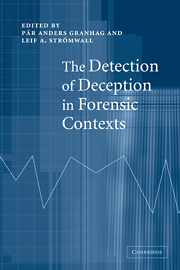Book contents
- Frontmatter
- Contents
- List of figures
- List of tables
- List of contributors
- Part 1 Introduction
- Part 2 Lie-detection techniques
- Part 3 Special issues facing a lie-catcher
- 6 Lies travel: mendacity in a mobile world
- 7 Coping with suggestion and deception in children's accounts
- 8 True or false: ‘I'd know a false confession if I saw one’
- 9 Crime-related amnesia as a form of deception
- Part 4 Enhancing lie-detection accuracy
- Part 5 Conclusions
- Index
- References
9 - Crime-related amnesia as a form of deception
Published online by Cambridge University Press: 22 September 2009
- Frontmatter
- Contents
- List of figures
- List of tables
- List of contributors
- Part 1 Introduction
- Part 2 Lie-detection techniques
- Part 3 Special issues facing a lie-catcher
- 6 Lies travel: mendacity in a mobile world
- 7 Coping with suggestion and deception in children's accounts
- 8 True or false: ‘I'd know a false confession if I saw one’
- 9 Crime-related amnesia as a form of deception
- Part 4 Enhancing lie-detection accuracy
- Part 5 Conclusions
- Index
- References
Summary
Much research on deceptive behaviour concerns differences between truthful and deceptive verbal and non-verbal responses. This chapter has a different angle in that we focus on stories that liars don't tell. Thus, this chapter is concerned with lying in the sense of concealing information by evading questions or omitting detail information. More specifically, we focus on homicide offenders who claim memory loss (i.e., amnesia) for their crime, and on whether such memory loss is genuine or feigned.
There are several reasons for investigating offenders' memory of violent crimes. One is that claims of amnesia for violent crimes, including murder, are very common. Obviously, some guilty suspects deny involvement in the crime or claim amnesia to avoid punishment. About 25–40 per cent of those who are found guilty of homicide claim to be amnesic or to have a complete memory loss (Schacter, 1986; Taylor and Kopelman, 1984), and the large majority of these claims are circumscribed to the crime itself (Bradford and Smith, 1979).
In clinical literature, various taxonomies of amnesia can be found. A common distinction is that between amnesia due to organic factors (organic amnesia) and amnesia due to psychological factors (e.g., malingering, emotional stress). As previous research has shown, different memory patterns emerge when amnesia originates from brain trauma, malingering, or severe emotional stress. Thus, the main question here is whether patterns of remembering and forgetting in an offender give hints as to whether his amnesia is genuine or malingered.
- Type
- Chapter
- Information
- The Detection of Deception in Forensic Contexts , pp. 195 - 226Publisher: Cambridge University PressPrint publication year: 2004
References
- 18
- Cited by



